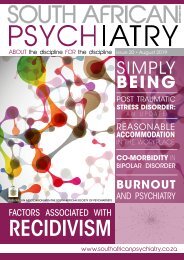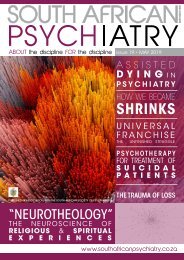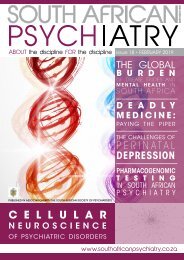South African Psychiatry - November 2020
South African Psychiatry - November 2020
South African Psychiatry - November 2020
You also want an ePaper? Increase the reach of your titles
YUMPU automatically turns print PDFs into web optimized ePapers that Google loves.
ADHD CONGRESS
1 ST SOUTHERN AFRICAN MULTIDISCIPLINARY ADHD CONGRESS
EMOTIONAL REGULATION IN ADHD:
CLASSROOM
STRATEGIES
Marelé Venter
EMOTIONAL REGULATION AND ADHD
Emotional regulation (ER) refers to the process
by which individuals influence which emotions
they have, when they have them, and how
they experience and express these emotions.
It can be automatic or controlled, conscious or
unconscious, and may have effects at one or
more points in the emotion producing process. ER
encompasses both positive and negative emotions,
along with how we can strengthen them, use
them, and control them. It has to do with initiating
and inhibiting actions triggered by emotions and
modulating responses triggered by emotions.
Children develop self-regulation through warm,
responsive relationships and by watching the
adults around them self-regulate. ER development
thus begins when children are babies, develops
most during the toddler and preschool years, but
also keeps developing into adulthood. However,
before we however can expect children to selfregulate
their emotions, they first need to have had
healthy co-regulating experiences. Adults example
of modelling healthy emotional self-regulation is
crucial. (Children are brilliant imitators: we need to
give them something healthy to imitate).
SO WHY IS ER ESPECIALLY RELEVANT
TO CHILDREN WITH ADHD? UNLIKE
POPULAR BELIEF, ADHD IS PRIMARILY
ABOUT EMOTIONAL REGULATION AND
SELF-CONTROL AND IS NOT JUST
ABOUT INATTENTION, IMPULSIVITY, AND
HYPERACTIVITY.
ER is foundational to social, emotional, and
academic success, but is often underdeveloped in
children with ADHD. The prefrontal cortex of the brain,
for example, in children with ADHD develops more
slowly (as much as 30% or more)
than in children without ADHD.
Thus a 10-year-old child with
ADHD may have self-regulation
skills similar to a typically
developing (neurotypical) 7-year
old. Medication helps decrease
impulsive, hyperactive, and/
or inattentive behaviour for
children with ADHD, but cannot
teach children the skills they
need to regulate.
Most interventions for ER are ineffective for ADHD
because they rely on using the cognitive brain
(executive functions - which are usually affected
by ADHD) to control the emotional brain. Instead,
we should look at harnessing the power of the
emotional brain, as it is powerful, infinite, a strong
motivator, fast, and contagious. We need to focus
on proactively regulating positive emotions.
CHILDREN WHO HAVE DIFFICULTY
REGULATING THEIR EMOTIONS OFTEN
HAVE TROUBLE LEARNING IN THE
CLASSROOM AND ARE LESS PRODUCTIVE
AND ACCURATE WHEN COMPLETING
ASSIGNMENTS.
The emotional brain (the limbic system) has the
power to open or close access to learning, memory,
and the ability to make novel connections. The ability
to regulate emotions is an essential prerequisite for
adaptive development and behaviour.
STRATEGIES FOR ER IN THE CLASSROOM
Marelé Venter
1. Keep the end goal in mind: The end goal is
not to simply decrease children’s challenging
behaviour, but to teach skills. When children
SOUTH AFRICAN PSYCHIATRY ISSUE 25 2020 * 51
















